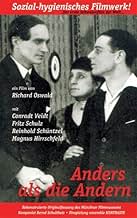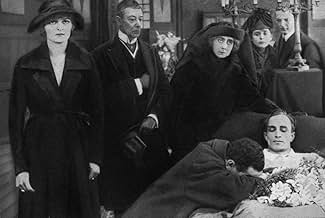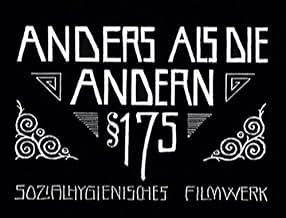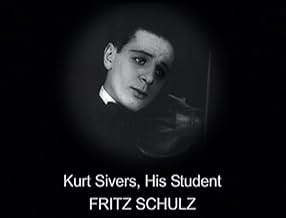IMDb RATING
7.0/10
1.6K
YOUR RATING
Two male musicians fall in love, but blackmail and scandal makes the affair take a tragic turn.Two male musicians fall in love, but blackmail and scandal makes the affair take a tragic turn.Two male musicians fall in love, but blackmail and scandal makes the affair take a tragic turn.
- Director
- Writers
- All cast & crew
- Production, box office & more at IMDbPro
Storyline
Did you know
- TriviaMagnus Hirschfeld, a prominent sexologist, co-wrote the screenplay and made a cameo appearance as The Doctor, with whom Paul Korner consults. A scene resembling that of the modern-day LGBT scene existed in Weimar Germany, albeit underground, and the scene at the gay bar featured actual LGBT individuals. The screenwriter and author Anita Loos said of this period, in 1923: "Any Berlin lady of the night might turn out to be a man: the prettiest girl on the street was Conrad Veidt, who later became an international film star." (It was Hirschfeld who coined the term 'transvestism.')
- Alternate versionsThere is an Italian edition of this film on DVD, distributed by DNA srl, "DIVERSI DAGLI ALTRI: Alle Origini Del Cinema Gay - Special Edition" (4 Films on a single DVD: Mikaël, 1924 + Fireworks, 1947 + Un chant d'amour, 1950 + Anders als die Andern, 1919), re-edited with the contribution of film historian Riccardo Cusin. This version is also available for streaming on some platforms.
- ConnectionsEdited into Gesetze der Liebe (1927)
Featured review
Two male musicians fall in love, but blackmail and scandal makes the affair take a tragic turn.
Director Richard Oswald was bold in making this film and pushing the message that homosexuality was not a crime but a failure of society to be accepting. Especially at the time when homosexuality was blatantly illegal in Germany. Not surprisingly, the film was soon banned and almost completely destroyed.
Conrad Veidt was also bold for starring in it, even if he had not yet been made into a star for "Cabinet of Dr. Caligari" the following year. This was at least Veidt's second time working with Oswald, having just finished up "Uncanny Stories".
The plot is interesting in making the presentation that homosexuality is normal (definitely a minority view at the time) and the real crime was extortion from those who would blackmail closeted men. Although neither Oswald nor Veidt were gay, they clearly had sympathy for their brethren (Veidt was later better known for standing up for the Jewish community).
Director Richard Oswald was bold in making this film and pushing the message that homosexuality was not a crime but a failure of society to be accepting. Especially at the time when homosexuality was blatantly illegal in Germany. Not surprisingly, the film was soon banned and almost completely destroyed.
Conrad Veidt was also bold for starring in it, even if he had not yet been made into a star for "Cabinet of Dr. Caligari" the following year. This was at least Veidt's second time working with Oswald, having just finished up "Uncanny Stories".
The plot is interesting in making the presentation that homosexuality is normal (definitely a minority view at the time) and the real crime was extortion from those who would blackmail closeted men. Although neither Oswald nor Veidt were gay, they clearly had sympathy for their brethren (Veidt was later better known for standing up for the Jewish community).
- How long is Different from the Others?Powered by Alexa
Details
- Release date
- Country of origin
- Languages
- Also known as
- Не такий як всі
- Filming locations
- Berlin, Germany(unknown scenes)
- Production companies
- See more company credits at IMDbPro
- Runtime50 minutes
- Color
- Sound mix
- Aspect ratio
- 1.33 : 1
Contribute to this page
Suggest an edit or add missing content

Top Gap
By what name was Different from the Others (1919) officially released in India in English?
Answer


























